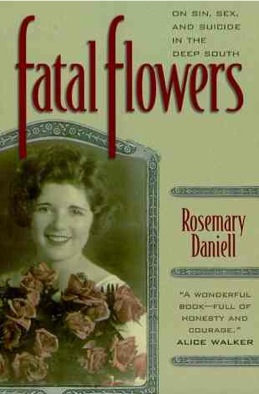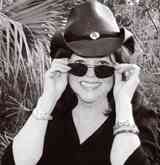







FATAL FLOWERS
When she was eleven, Rosemary Daniell sat in the Bolton, Ga., Methodist church and "dreamed of marrying the blond boy" a few pews away, "in a baby-blue wedding with six bridesmaids, of becoming the perfect housekeeper and sex partner, and of having six children [and] writing perfect novels while perfect cakes baked in the oven in my Betty Crocker kitchen." She never made it. Instead, Daniell got hitched at 16 to a classically brutal good ole boy, divorced him and married upward to a dull architect, raised three children, had an affair with a "Famous Southern Poet," married again, a Northerner a decade her junior, left him for an extended orgy of Jack Daniel's, Quaaludes, dope, depression and her ultimate salvation, writing. Along the way, her father became an alcoholic, her mother killed herself, her son ran away at age 13 with a 19-year-old topless dancer, and Daniell landed a job teaching poetry to women in Georgia prisons and published in 1975 a collection of feminist poems, A Sexual Tour of the Deep South.
The real Dixie woman, says Daniell, is doomed to madness, spinsterhood or suicide unless she conforms to one of a few revered stereotypes. There is, among others, the belle, charming and pampered to a fare-thee-well, groomed for little more than catching men: "If a woman behaved correctly—that is, in a properly manipulative and feminine way—she would receive the rewards of a doting (and successful) husband, comfortable house, beautiful children, and freedom from the need to work for a living." There is also the good ole girl, "realistic and materialistic and loyal to the land. Being a good ole girl means standing by your man and not making waves. Good ole girls come sexy or pure, and in either case are respected by good ole boys. All the women in country-music songs are good ole girls."
Fatal Flowers, subtitled On Sin, Sex, and Suicide in the Deep South, is the author's attempt to describe the plight of such Southern womanhood by reporting how she grew up poor and frustrated in a region overripe with lust and repression: "What I had once seen as the condition of being female, I now saw as female and Southern. I perceived my mother, grandmothers, sister, daughters—and all the women whose roots I shared—as netted in one mutual silken bondage. Together, we were trapped in a morass of Spanish moss, Bible Belt guilt, and the pressures of a patriarchy stronger than in any other part of the country."
Translation: the biggest thing wrong with Southern women is Southern men. Maybe so. But Daniell's argument is not nearly as compelling as the relatives and acquaintances she uses for illustration: the cousin who took to bed for 20 years after her father forbade her to marry the man she loved, the car-crazy boyfriend whose kisses tasted of brake fluid, the professor who had an arrowed heart containing the legend "Mother" tattooed on his groin.
Though she finds it degrading in Dixie, Daniell refuses to run: Southern women like to live dangerously. "The way I feel about being a woman in the South is the way I feel about the oleander that blooms in June: though it's said that the sap, even brushed against one's skin, is toxic, I carelessly break the branches, stick the ravishing flowers into my hair . . ." If Rosemary Daniell can turn down her volume without losing the force of blood, sex and anger, she just might turn out to be one of those fine female writers unique to her region (Eudora Welty, Flannery O'Connor, Katherine Anne Porter, Alice Walker, Caroline Gordon). If the South doesn't kill her first, that is.
— Donald Morrison
The Belle Jar
By HP-TIME.COM;DONALD MORRISON Monday, May. 05, 1980

